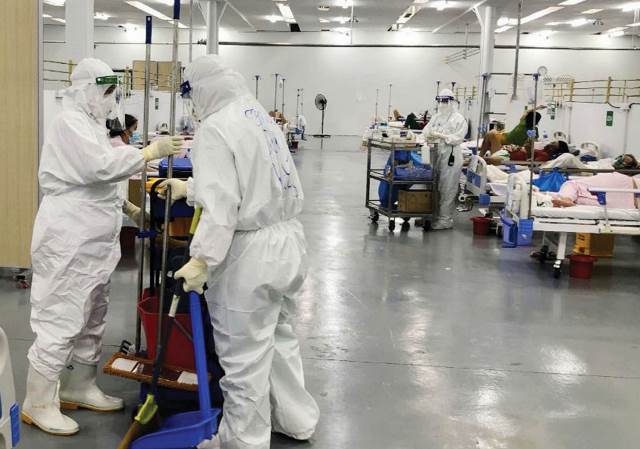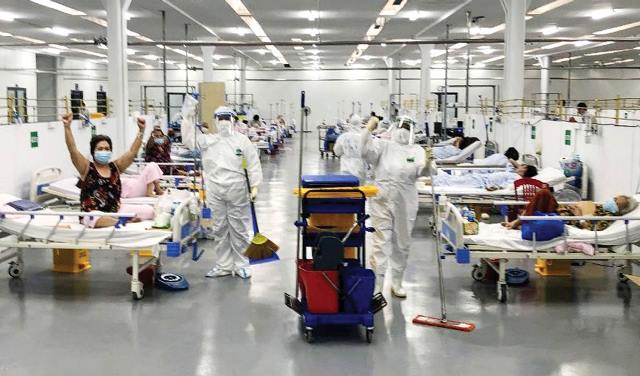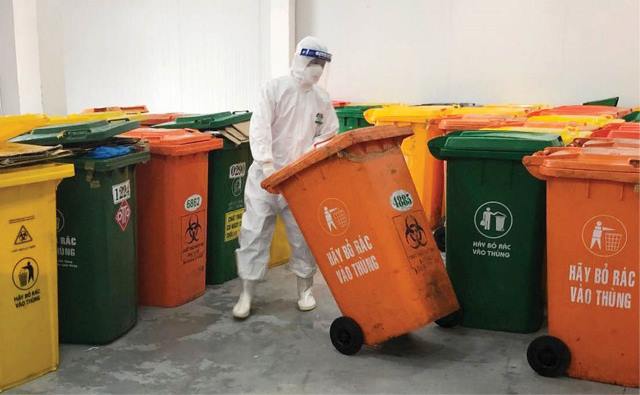
Sanitation workers coming from Hue
Setting aside their worries
For nearly a month now, in her protective clothing, Van Thi Phuoc (47 years old) has always been busy with cleaning patient rooms. Her job is to clean and disinfect floors, walls, and beds to ensure that the rooms are always clean, hence reducing the risk of cross-contamination in medical environment.
Her house is in Hue City. For many years now, she has been a sanitation worker at Hue Central Hospital. After the doctors and the medical staff were sent to Ho Chi Minh City to build the Intensive Care Unit for COVID-19 patients, she and her colleagues were encouraged to go to the South to support doctors and nurses. Without any hesitation, she volunteered to join.
As Phuong said, before, through the mass media, she knew Ho Chi Minh City was then the “center of the epidemic,” and the situation was very complicated. She worried that she would get infected. But her sense of responsibility for work and her love for people outweighed her worries. She thought maybe they needed me.

Before that, she had been trained to work in an infectious environment and how to wear the protective gear properly. She hence felt more secure to hit the road.
Le Thi Tuyet (38 years old, sanitation worker at Hue Central International Hospital) also got over her fear to volunteer to the "epidemic center.” “I’ve worried a lot since the day I registered. I even thought about being infected and facing death. But then I thought the hospital needed me. Then I should try my best. Thanks to strict regulations about hygiene and disinfection everyone has been fine so far,” said she smiling.
Tuyet has 3 children. The eldest is in the 11th grade and the youngest is in the 3rd grade. Fortunately she was backed by her family. While she was away, her husband took care of the housework and looked after their kids. The eldest child also helped his father with odd jobs and to take care of his younger brother. It is the joy that helps her continue to maintain her will to do a good job of effectively supporting doctors on the front lines.
What she desires is that more and more patients will heal and return home with their loved ones, and that the epidemic will be over soon so that she can return home with her family.
Everyone contributes his/her own part
Le Van Than (38 years old, sanitation worker at Hue Central Hospital) is among the few male sanitation workers who were sent to Ho Chi Minh City. He is busy every day from 8am to 16pm. Although each shift lasts 8 hours, he volunteers to stay longer to do work such as pushing heavy trash bins which he thinks too hard for women. Very often he gets home very late at night.
Before coming here, my colleagues and I have been fully vaccinated, which partially reduces our worries. Though facing the risk of infection, we always encourage each other to try. Each of us should contribute to helping people in Ho Chi Minh City win the epidemic,” said Than.

Working in a high-risk environment
The squad consists of 30 experienced sanitation workers crossing more than 1,000 kilometers from Thua Thien Hue to Ho Chi Minh City. They all have been trained professionally. The youngest one is Nguyen Huu Hung, just 26 years old. He is in charge of working at the Intensive Care Center for critical cases of COVID-19.
One working day is divided into 3 shifts, and Hung takes the night shift, working from 10pm to 6am the next morning. However because of the heavy workload while workers are few, Hung and his colleagues are willing to work overtime. Coming early and leaving late were usual.
“Working the night shift is hard because we have to stay up all through the night. As more patients come in and the workload increases, we have to work even more. Completing my shift, I come back home exhausted,’ said Hung smiling.
There were times when he felt worn out, but just a bit of rest can make him fine again to continue his work. He wants to dedicate his youth to fighting the epidemic together with doctors and nurses in Ho Chi Minh City and bring people’s life back to normal soon.
Story and photos: Thuong Thuong